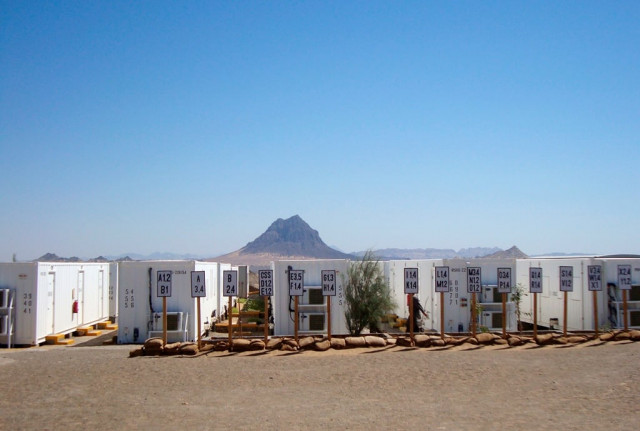Reko Diq gold mine project: Pakistan may face $11.5-billion penalty
World Bank’s arbitration tribunal rules in favor of Tethyan Copper Company

Empty trailers for housing workers at the site of the gold and copper mine exploration project of Tethyan Copper Company (TCC) are seen in this undated photo in Reko Diq, in Balochistan, Pakistan. PHOTO: REUTERS
The World Bank’s International Center for Settlement of Investment Disputes (ICSID) had earlier rejected Pakistan government’s application to dismiss TCC’s claims on grounds of corruption and malpractices by the latter.
Balochistan wants Chinese helping hand for its mining industry
Both the federal and provincial governments submitted applications before the ICSID and the International Criminal Court (ICC) in The Hague during 2015-16, seeking admittance of new evidence showing TCC’s corrupt practices in Reko Diq affairs for illegal and undue gains.
The move was futile, however, as the court ruled against the government for unlawful denial of the mining lease for Reko Diq to TCC- a joint venture between Chile’s Antofagasta and Canada’s Barrick Gold Corporation.
The arbitration claim had been submitted in 2012 by the TCC. Five years later, in 2017, it filed for compensatory damages amounting to $9.1 billion based on fair market value of its investments in the project till November 15, 2011. In addition, it also filed a claim of $2.3 billion as pre-award compound interest.
The government has to submit its reply to TCC’s damages claims by July 21.
The previous government of Pakistan Peoples Party (PPP) had tried to settle the dispute with TCC but failed. It had also warned the Balochistan government that the federal government will not pay damages in case of an adverse ruling from international tribunals.
TCC held 75% shares in the project while Balochistan had a 25% stake. The company claims it has invested over $500 million in exploration, scoping and feasibility studies on the project. Total investment was projected to be $5 billion over a period of five years.
TCC and Balochistan reached a deadlock in 2009 because of two issues. First, TCC wanted Balochistan to bear 25% financial obligation according to its share in the project. But the province refused to take any financial responsibility.
Second was the purported involvement of a Chinese company in the project. A letter written by Pakistan’s Ambassador to Chile Burhanul Islam to then Petroleum Minister Naveed Qamar in September 2009 had advised against involving Metallurgical Corporation of China in the same mining site.
Not a dime spent on environmental protection
In a feasibility report submitted to the Balochistan government, TCC projected a turnover of over $60 billion for the gold and copper project over a span of 56 years. This projection was based on a price of $2.2 per pound of copper and $925 per ounce of gold, in the year 2009.
The mine has estimated reserves of 11.65 million tons of copper and 21.18 million ounces of gold.
Published in The Express Tribune, July 12th, 2017.
Like Business on Facebook, follow @TribuneBiz on Twitter to stay informed and join in the conversation.



















COMMENTS
Comments are moderated and generally will be posted if they are on-topic and not abusive.
For more information, please see our Comments FAQ